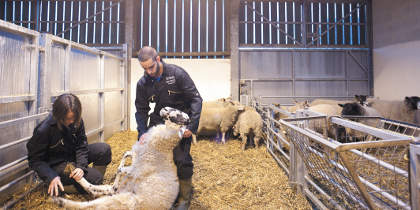
September 20, 2009, by Teaching at Nottingham
Perceptions of first year undergraduates of facilitated and non-facilitated small group learning environments
Kevin Gough, Karl Klisch, Rachael Tarlinton and Lisa Yon: “Student-centered learning is of growing importance within Higher Education and increasingly includes student-led as well as facilitated small group learning environments. The School of Veterinary Medicine and Science has adopted both of these approaches, with students undertaking facilitated clinical relevance (CR) and non-facilitated directed group learning (DGL) sessions.
“Within this project, students were asked to complete questionnaires throughout the first module of the course. Questionnaires were a mix of free response and categorized questions to assess how well first year undergraduates were prepared for small group learning, their experience within these sessions and to identify any problems they encountered. Questionnaires were delivered to 97 students and elicited an 86-95% response rate. In addition, their facilitators completed a questionnaire about the CR sessions to assess student performance.
“Following a two week introduction to the course, over 90% of students rated their training as good or very good for CR whereas only 47% of students felt similarly prepared for DGL sessions. Throughout the module, over 90% of students were very positive about CR sessions, both in terms of enjoyment of the sessions and the ability of sessions to improve their subject knowledge. In contrast, only 46%-62% of students gave a similar rating for DGL sessions.
“Within CR sessions, 37% of students perceived themselves as being under-confident (with very similar percentages for female and male) with just 7% feeling that they were overconfident (all female). In contrast, their facilitators felt that 14% of them were under-confident and 14% overconfident, illustrating a divergence in student and facilitator perceptions.
“Asked for an overall impression of their group’s performance, 69% of students felt that their group had improved within CR sessions through the module, but only 36% felt the same about DGL sessions with 30% stating that their group’s performances deteriorated through the module. Students mentioned difficulties in maintaining motivation/focus within DGL sessions as a contributing factor and it was apparent that the vast majority of students routinely completed tasks outside of their DGL group.
“From this study it seems clear that students value and enjoy CR sessions considerably more than DGL sessions. Future studies could investigate whether these problems with DGL sessions are rooted within differences in student-training, or differences in subject matter or the format of the sessions. Here, questionnaires were used to provide a broad overview of student opinions and to facilitate anonymity, but this format allowed limited detail within students’ responses. The inclusion of student interviews in any future study may be more enlightening.
“This study clearly illustrates that the student training required for facilitated and non-facilitated sessions is distinct and courses that adopt non-facilitated sessions should consider using specific training. At Nottingham, non-facilitated DGL sessions are an integral part of the Veterinary course to improve students’ team working and communication skills. It is now planned that the training for these sessions will be revised within the introductory weeks. A similar follow up study of future cohorts would be informative as to the efficacy of this new training.”
Paper presented at the University’s Fifteenth Learning & Teaching conference (September, 2009).
| Prof Kevin Gough Associate Professor of Biochemistry and Pathology School of Veterinary Medicine & Science |
Dr Karl Klisch Lecturer of Clinical Veterinary Anatomy School of Veterinary Medicine & Science |
| Dr Rachael Tarlinton Lecturer in Veterinary Cellular Microbiology School of Veterinary Medicine & Science |
Dr Lisa Yon Lecturer in Zoo and Wildlife Medicine School of Veterinary Medicine & Science |
This article was originally published as part of PESL’s Teaching at Nottingham collection.
No comments yet, fill out a comment to be the first

Leave a Reply